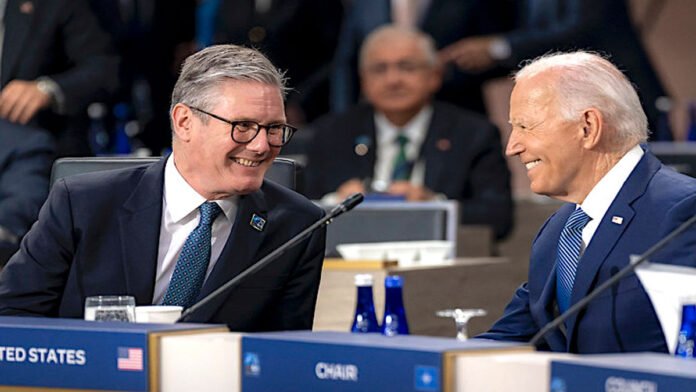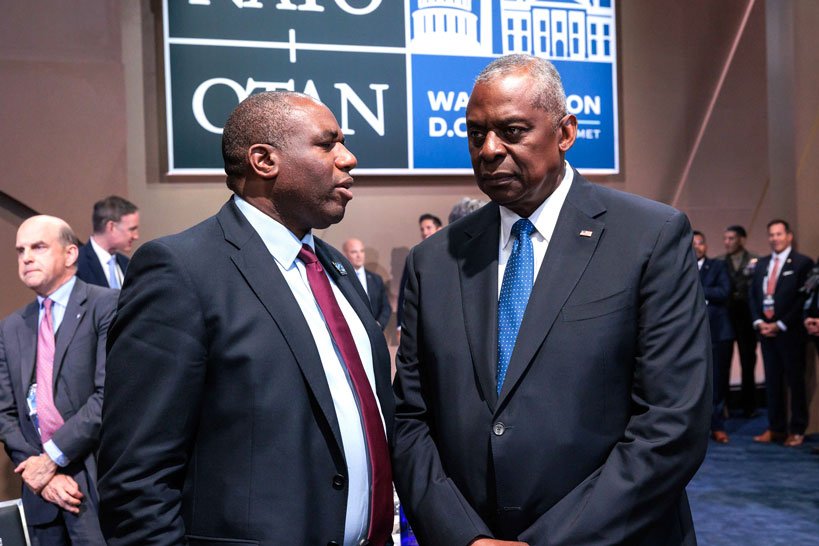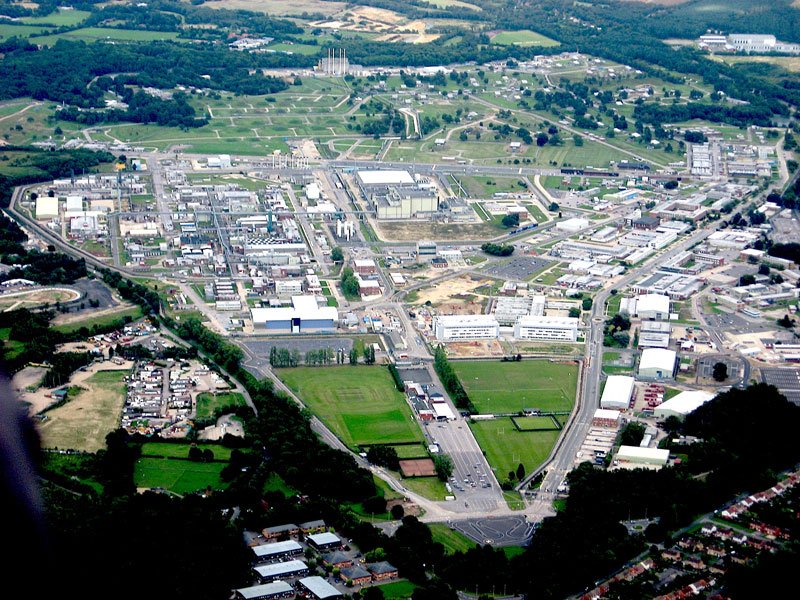
By Richard Norton-Taylor
Declassified UK
Richard Norton-Taylor says the Starmer government’s rewriting of a transatlantic treaty undermines persistent claims that Britain’s Trident missile system is operationally independent.

Labour has reinforced the “special relationship” with Washington by agreeing to make Britain’s nuclear arsenal permanently dependent on the U.S.
In one of its first, but little-noticed foreign policy moves, Labour has amended the Eisenhower-era 1958 Mutual Defence Agreement (MDA) that is crucial to Britain’s Trident nuclear missile system.
Officials deleted a long-standing sunset clause that required it be renewed every 10 years.
All references to an “expiry date” have been removed “to make the entirety of the MDA enduring, securing continuing cooperation with the U.S.,” according to a memorandum signed by Defence Secretary John Healey.
Kate Hudson from the Campaign for Nuclear Disarmament (CND) told Declassified: “This spells farewell to even the smallest notion of parliamentary responsibility for Britain’s foreign and defence policies.”
She added that at least nominally, Parliament has had the opportunity, once a decade, to debate and reconsider America’s role in Britain’s nuclear programme.
“This amendment, introduced in the most undemocratic fashion by the government — at a time when it will be lost in the recess and party conference season — will eradicate those opportunities. This must not go unchallenged.”
The change was agreed by senior British and U.S. officials on July 25, three weeks after Keir Starmer became U.K. prime minister.
It comes as Starmer described Britain’s nuclear weapons as the “bedrock” of the country’s defence and amid concern about possible threats to the future of the MDA if Donald Trump wins back the White House.
During a visit to Washington shortly before the general election, David Lammy, now foreign secretary, told a centre-right think tank that Labour: “will always work with the United States, whatever the weather…”

The MDA enables the U.S. to provide Britain with nuclear weapons materials and know-how without which Trident would not be able to function.
It gives the lie to persistent claims by the Ministry of Defence that Britain’s submarine-launched nuclear arsenal is “operationally independent.”
Trident missiles themselves are obtained from America and a cross-party report concluded that the life expectancy of Britain’s nuclear capability without U.S. support could be measured in months.
U.S. presidents have also alluded to this dependency, with George W. Bush saying in 2005 that the U.S. helped Britain maintain a “credible nuclear force”.
Barack Obama declared it was in America’s interest to continue to help Britain “in maintaining a credible nuclear deterrent” when the MDA was renewed 10 years ago.
As Declassified recently reported, British military aircraft regularly cross the Atlantic with highly radioactive ingredients supplied by the U.S. These ingredients are absolutely vital to the Trident missile system.
The memorandum signed by Healey states:
“The MDA provides the necessary requirements for the control and transmission of submarine nuclear propulsion technology, atomic information and material between the UK and US, and the transfer of non-nuclear components to the UK.”

It continues:
“The MDA underpins the defence nuclear relationship between the UK and US.”
Above Democracy
The memo further states that the amendment does not require any change in the law. Although the MDA is incorporated in U.S. law, it has no statutory basis in the U.K.
Astonishingly, despite its huge significance, it has never been the subject of a substantial debate in Parliament.
The government describes the MDA as covering the exchange of information on “sensitive nuclear technology” for developing “defence plans” and “military applications of atomic energy.”
Other aspects involve evaluating “the capabilities of potential enemies in the employment of atomic weapons.”
It also concerns the sale of “naval nuclear propulsion plants” and the transfer of materials like U-235 enriched uranium.
However, governments have long refused to provide information about how much nuclear material for British warheads the U.S. has provided to the Atomic Weapons Establishment at Aldermaston and the nearby Burghfield warhead factor, and at what cost.

The quantity is likely to be significant. Nearly 1,000 non-nuclear components for atomic weapons systems were exchanged between the U.S. and U.K. in 2020-23 under the MDA, according to new research by the Nuclear Information Service.
A Ministry of Defence spokesperson said the removal of the 10-year renewal provision was decided “given the longstanding nature of this agreement.” She added that making the entirety of the MDA “enduring” was “the case with other international agreements.”
Peter Burt of Nukewatch UK, which monitors the U.K.’s nuclear weapons programme, commented:
“Every U.K. prime minister since the Second World War has been petrified about losing influence with the U.S., and in a large part this hinges around access to nuclear weapons technology and military intelligence.
“This is the main reason the U.K. government always aligns itself with U.S. foreign policy and allows itself to be drawn into U.S. military adventurism, even when it is clearly not in the interests of this country to follow America.”
Richard Norton-Taylor is an editor, journalist, playwright and the doyen of British national security reporting. He wrote for The Guardian on defence and security matters and was the newspaper’s security editor for three decades.
This article was first published by Declassified UK.
Support Independent Journalism Today
Our unwavering dedication is to provide you with unbiased news, diverse perspectives, and insightful opinions. We're on a mission to ensure that those in positions of power are held accountable for their actions, but we can't do it alone. Labour Heartlands is primarily funded by me, Paul Knaggs, and by the generous contributions of readers like you. Your donations keep us going and help us uphold the principles of independent journalism. Join us in our quest for truth, transparency, and accountability – donate today and be a part of our mission!
Like everyone else, we're facing challenges, and we need your help to stay online and continue providing crucial journalism. Every contribution, no matter how small, goes a long way in helping us thrive. By becoming one of our donors, you become a vital part of our mission to uncover the truth and uphold the values of democracy.
While we maintain our independence from political affiliations, we stand united against corruption, injustice, and the erosion of free speech, truth, and democracy. We believe in the power of accurate information in a democracy, and we consider facts non-negotiable.
Your support, no matter the amount, can make a significant impact. Together, we can make a difference and continue our journey toward a more informed and just society.
Thank you for supporting Labour Heartlands











